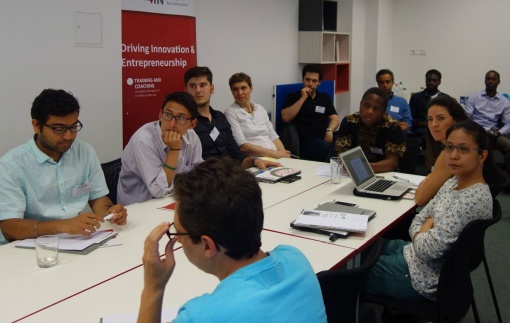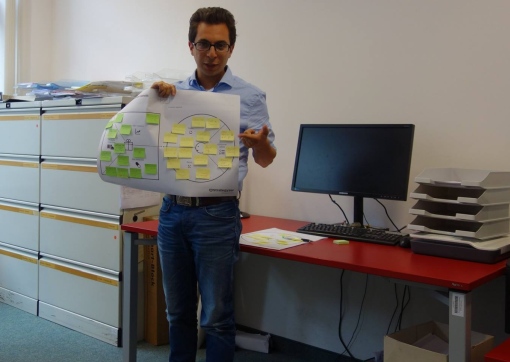An inexpensive method of producing sustainable energy, an innovative website or a modern farm: in July, students and alumni of the Development-Related Postgraduate Courses (EPOS) subjected their plans to a reality check at the first AGEP Business Start-Up Clinic.
Students of many EPOS degree courses have the technical know-how to develop products or services for their home countries. If these were to grow into successful businesses, the founders would not only have real career options but also create jobs and contribute to economic growth.
But how do you start your own business? Answers to this question are provided by Leipzig University through the DAAD-funded degree course Small Enterprise Promotion and Training (SEPT). The university invited students and alumni to the first AGEP Business Start-up Clinic, to support new projects and help network the EPOS-degree courses.

Intensive training: After a professional input, the participants worked in groups to develop their ideas © SEPT
The concept comes from the entrepreneurship initiative SMILE, also from Leipzig University. In the past 10 years, coaches have helped with the founding of close to 400 companies. For the three-day training during the Start-up Clinic, SEPT programme director Professor Utz Dornberger and SMILE senior consultant Christian Hauke selected 20 applicants. “We chose projects that we thought were feasible and had good potential for development,” says Christian Hauke, who acted as coach to the participants.
One of these ideas originated with Saleem Barkeel, from Syria: “A website will provide Syrians with information on how to rebuild their houses after the civil war – strongly and sustainably.” In the style of the website Wikipedia, skilled Syrians who have left the country as well as international experts will contribute. The idea came to the DAAD alumnus during his master’s course in Renewable Energy, which he completed in March at the University of Oldenburg.
Rethinking for the customer
Using creative methods, the students and alumni in the Start-up Clinic switch their perspective. Who is my customer? What is his/her problem? How does the customer reach me? “The challenge is to rethink everything, orienting it around the customer”, according to Christian Hauke. “Only someone who can realistically implement his/her idea, has the chance to be a successful entrepreneur.”
Most of the participants want to bring their projects to life in their home countries. This gives them a decisive advantage over foreign enterprises, knows course coordinator Christine Tonscheidt, organiser of the Start-up Clinic. “They know the language, culture and structures and can better estimate needs.” Several students, for instance, developed alternative cooking options, because in many regions ovens are still heated with wood. This exerts pressure on natural resources and harms the environment and people’s health. Other students work on modernizing family farms to conserve the soil while still achieving a good yield.
In addition to the coaches’ input and help, participants exchange ideas among themselves. “We’ve formed groups on agriculture, bioenergy and services”, says Christine Tonscheidt. And it works: “I was able to build a network with participants who were working on projects similar to mine”, says Saleem Barkeel. The group work was also enriching for Niranjan Mukherjee: “When I got stuck, the others had brilliant suggestions for solutions”. The Indian is a DAAD scholarship holder in the course Hydro Science and Engineering at the TU Dresden. He would like to equip the backyards of housing complexes in Mumbai with biogas facilities so that the residents can produce energy from their own biological waste.
From idea to business
On the way toward implementation, the AGEP Business Start-up Clinic is just the beginning. “We’ve raised awareness among the participants; they know that an idea is not a product”, says Christian Hauke. Syrian Saleem Barkeem has realized that further steps are necessary: “Thanks to the professional coaching, I was able to put my thoughts down on paper for the first time. Now I want to work out a business plan and raise financial support for my project”. He is ensured the help of the coaches – they and their expertise remain available to all participants.
More Information
AGEP: www.agep-info.de
SEPT: www.sept.uni-leipzig.de
SMILE: www.smile.uni-leipzig.de






